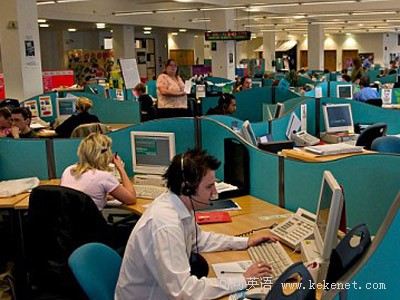
There are some who don't need an excuse to skip a day's work - but this could be a good reason to quit your job altogether. A badly-paid or temporary job can be as bad for a person's mental health as none at all, researchers claim. Little job security, demanding work and poor managers can all impact on a person's well-being just as much as unemployment. Stress: Being unhappy at work can be worse for mental health than having no job at all, researchers claim (file picture)
經濟不景氣、失業人數增多,這個殘酷的社會讓置身其中的我們喘不上氣,害怕“被裁員”、恐懼“丟飯碗”的不安每天環繞在我們的腦海中,揮之不去。都說待業在家的人,沒有工作的人精神上、生理上都會遭受重重打擊,可是最新的科學研究指出:一份悲催的工作可以讓你把小命給丟了,而相比而言,待業、失業對健康會更有益處。據悉,在這里的“悲催的工作”指的是薪水超級低、和付出成反比的工作、還有暫時性的工作等都會對健康產生致命的壞處。此外,壞工作給于的不安全感還有頂頭上司的糟糕行為可以直接對我們的健康造成大的沖擊,沖擊程度不亞于失業帶來的悲哀情緒。
In fact, people who are unemployed can feel better-off mentally than those who are in poor jobs of low 'psychosocial quality', the report added. Researchers said government policies tend to focus on job seekers when they should also take into account the quality of a person's job. Writing in the journal Occupational and Environmental Medicine, a team at the Australian National University in Canberra, said: 'This study has shown that work of poor psychosocial quality, characterised by low job control, high job demands and complexity, job insecurity and the perception of unfair pay, does not bestow the same mental health benefits as employment in jobs with high psychosocial quality.
報道稱,待業的人相對那些埋頭苦干一份壞工作的人“身心更健康”,研究人員建議政府部門在針對那些求職者做的任何調查,除了要考慮到求職者的就業率,還要考慮到職場工作的“質量”,這里的質量包括很多“軟因素”,比如做這份工作的人到底開心不開心等等。
'In fact, we found that moving from unemployment to a job with poor psychosocial quality was associated with a significant decline in mental health relative to remaining unemployed. 'This suggests that psychosocial job quality is a pivotal factor that needs to be considered in the design and delivery of employment and welfare policy.' Studies have long found that people in work enjoy better mental health than those who are unemployed. But fewer studies have examined how people feel about their jobs when they are in employment.
在實驗中研究人員發現,一個人從失業狀態到從業狀態的心理變化對自身的健康有著巨大的影響,不單單要考慮到自己能不能勝任這份工作,還要考慮到“工作上的心理安全感”,這點是至關重要的。特別是對于相關就業政策給于的傾向方面,對于“工作中心理方面的建設”擺在了桌面上,需要被重視,而且情況迫在眉睫,工作中的健康問題不容忽視,做一份悲催的工作還不如好好待家做個失業的人呢,科學家說了,這樣壽命會更長一些啊。











